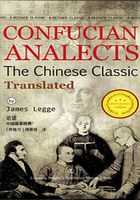
CHAPTER 3
1. Tsze-hwa being employed on a mission to Ts'e, the disciple Yen requested grain for his mother. The Master said, "Give her a foo." Yen requested more. "Give her an yu," said the Master. Yen gave her five ping.
2. The Master said, "When Ch'ih was proceeding to Ts'e, he had fat horses to his carriage, and wore light furs. I have heard
2. THE RARITY OF A TRUE LOVE TO LEARN. HWUY'S SUPERIORITY TO THE OTHER DISCIPLES. In 有颜回者, 者= 'that'—'There was that Yen Hwuy'. 'He did not transfer his anger', i.e., his anger was no tumultuary passion in the mind, but was excited by some specific cause, to which alone it was directed. 短命死矣,= 'He died an early death', but 命 conveys also the idea in the transl. The two last clauses are completed thus:—今也, 则亡 (read as, and= 无) 是人, 未闻如是之好学者也.
3. DISCRIMINATION OF CONFUCIUS IN REWARDING OR SALARYING OFFICERS. 1. 使, up. 3d tone, 'to commission', or 'to be commissioned'. Choo He says the commission was a private one from Confucius, but this is not likely . The old interpretation makes it a public one from the court of Loo; see 四书改错, III.9. 再子, 'The disciple Yen'; see III.6. Yen is here styled子, like 有子, in I.2, but only in narrative, not as introducing any wise utterance. A foo contained 6 tow(斗), and 4 shing(升), or 64 shing. The Yu contained 160 shing, and the ping 16 hŏ(斛), or 1600 shing. A shing of the present day is about 1/4th less than an English pint. 2. The之 in 吾闻之, refers to what follows. 3. In He An's edition, another chapter commences here. Yuen Sze, named 宪, is now the third, east, in the outer hall of the temples. He was noted for his pursuit of truth, and carelessness of worldly advantages. After the death of Conf., he withdrew into retirement in Wei. It is related that Tsze-kung, high in official station, came one day in great style to visit him. Sze received him in a tattered coat, and Tsze-kung asking him if he were ill, he replied, 'I have heard that to have no money is to be poor, and that to study truth and not be able to find it is to be ill.' This answer sent Tsze-kung away in confusion. The 900 measures (whether they were) was the proper allowance for an officer of Sze's station. 为之宰, See V.7, though it is not easy to give the之the same reference here as in that passage.4. According to ancient statutes, a lin, a le, a heang, and a tang, have each their specific number of component families, but the meaning is no more than—'the poor about you'. 乎makes the remark= 'may you not, &c.'

that a superior man helps the distressed, but does not add to the wealth of the rich."
3. Yuen Sze being made governor of his town by the Master, he gave him nine hundred measures of grain, but Sze declined them.
4. The Master said, "Do not decline them. May you not give them away in the neighborhoods, hamlets, towns, and villages?"